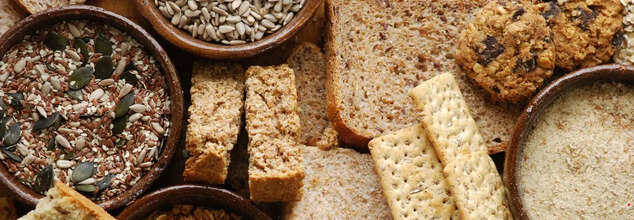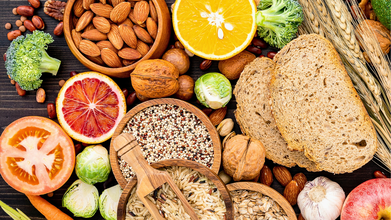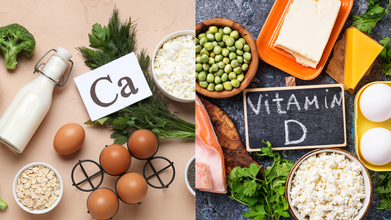- Health Conditions A-Z
- Health & Wellness
- Nutrition
- Fitness
- Health News
- Ayurveda
- Videos
- Medicine A-Z
- Parenting
Is There A Right Time To Consume Fibre?

Fibre (Credit: Canva)
Fibre, also known as roughage, is important for your overall health. A person needs fibre for digestion, weight control, to manage cholesterol and blood sugar and to strengthen bones. However, have you ever wondered if there is a right time to consume fibre and its supplements?
How Much Fibre Does One Require In A Day?The recommended daily intake of fibre is 25 grams per day for women and 38 grams per day for men. However, some experts estimate as much as 95 per cent of the population doesn’t ingest this much fibre, and may require fibre supplements due to dietary and age restrictions. On the other hand, ingesting too much fibre, while uncommon for most people, can lead to several uncomfortable digestive and health-related side effects.
Does Timing Matter?
No, Fibre can be consumed throughout the day. However, one needs to be careful while consuming fibre supplements. There is limited research which underscores that timing does matter. Many studies suggest taking fibre supplements at meal times can help your body absorb them better and may make them more effective. No matter when you consume the supplements, consistency is the key. Irregular intake of fibre supplements can trigger discomfort like bloating, gas, and changing bowel patterns.
Should You Take It With Food?
Most research suggests that taking fibre supplements with food can help improve digestion and prevent digestive discomfort. Taking fibre before a meal may help control your appetite and help you feel full. Taking it after a meal may support digestion by bulking up your stool. Some people may experience discomfort when taking a fibre supplement too close to mealtimes. Unless your healthcare provider or registered dietitian says otherwise, consider taking fibre at least 30 minutes before or after eating. You should also drink plenty of water.
What Happens When You Consume Excessive Fibre?
Consuming excess fibre or its supplements can result in bloating. Insoluble fibre found in whole grains, vegetables, and nuts, can increase gas production during digestion, causing bloating. It can also cause abdominal pain. Too much fibre can cause the digestive system to work harder than usual, leading to abdominal cramping or discomfort. This occurs as fibre moves slowly through the intestines, increasing the workload on the digestive muscles.
Flatulence (Gas) is another issue. Fibre-rich foods, especially legumes, vegetables, and grains, produce gas as they break down in the intestines. This is a normal byproduct of digestion, but excessive fibre can lead to more gas than the body can comfortably handle.
Soluble fibre, found in oats, beans, and fruits, absorbs water, which can lead to overly loose stools or diarrhoea, as excess water may remain in the intestines. On the flip side, an abrupt increase in fibre without enough water intake can cause constipation. Fibre requires water to move smoothly through the digestive tract, so dehydration or insufficient hydration can lead to harder stools.
High-fibre foods tend to be bulkier, and consuming too much can lead to temporary weight gain due to water retention and slower movement of fibre through the digestive tract. Additionally, fibre can make you feel fuller, causing temporary bloating. Excessive fibre intake can cause a blockage in the intestines, particularly in people with Crohn’s disease or other inflammatory bowel conditions. Since fibre isn’t fully broken down, it can accumulate, potentially causing an obstruction.
Fibre helps slow down the absorption of sugar, leading to more stable blood sugar levels. However, too much fibre may lower blood sugar too drastically, which is a concern for people with diabetes who may be monitoring their blood sugar levels closely.
Harvard Scientists Reveal The Real Diet Secret To Heart Health

Credit: Canva
A massive study that tracked nearly 200,000 people has found that the quality of food, rather than the quantity of carbs and fats, affects heart health.
Public health researchers from Harvard University spent over 30 years examining the participants and discovered that if a diet contains too many processed foods and animal proteins or fats, or if it otherwise lacks in adequate vegetables, fruits, whole grains, healthy fats, or essential macronutrients, it may not benefit cardiovascular health as much in the long run, even if it is low carb or low fat by definition.
The scientists noted that those who ate healthy, varied diets with adequate macronutrients showed higher levels of 'good' cholesterol in their blood as well as lower levels of fats and inflammatory markers as compared to their counterparts.
The same group of people also had a significantly lower risk of developing coronary heart disease, the most common cause of heart attacks.
Based on their conclusion, Harvard epidemiologist Zhiyuan Wu, who led the research, advised: "Focusing only on nutrient compositions but not food quality may not lead to health benefits.
"These results suggest that healthy low-carbohydrate and low-fat diets may share common biological pathways that improve cardiovascular health. Focusing on overall diet quality may offer flexibility for individuals to choose eating patterns that align with their preferences while still supporting heart health."
The Rising Heart Attack Crisis
Heart attacks occur when blood flow to the heart is severely reduced or blocked due to a buildup of plaque which is made of fat, cholesterol and other substances in the heart's arteries.
During a heart attack, a lack of blood flow causes the cells and tissue in the heart muscle to die, leading to irreversible damage that can result in serious complications like arrhythmias, heart failure, cardiogenic shock, or cardiac arrest.
It is one of the leading causes of death in the country. Four Indians experience a heart attack every minute, with one in four dying of the cause. Experts have also noticed a rising trend of nearly 50 percent of heart attack patients being under the age of 40, with half of all heart attacks in Indian men occurring under 50.
Coronary Artery Disease: The Silent Killer
Coronary artery disease (CAD) is one of the most common illnesses that can cause a heart attack in people. It develops over years and has no clear signs and symptoms apart from a heart attack.
The illness begins due to a buildup of fats, cholesterol and other substances known as plaque in and on the artery walls.
Over time, this can cause narrowing or blockage of the coronary arteries and block the supply of oxygen-rich blood to the heart which can lead to chest pain (angina), shortness of breath and ultimately, heart attacks.
Typically, those above the age of 45, having a biological family member with heart disease, lack of sleep, smoking, consuming saturated fats along with other autoimmune diseases such as lupus and rheumatoid arthritis, can increase the risk of developing CAD.
Nearly one in 10 Indian adults suffer from CAD and about two million people die from the disease annually. Apart from this, about 18 to 20 million American adults aged 20 and older are also affected about the disease.
How Much You Should Exercise To Prevent CAD?
The American Heart Association recommends performing at least 150 minutes per week of moderate-intensity aerobic activity, such as brisk walking, dancing and gardening or 75 minutes per week of vigorous aerobic activity, such as hiking, running, cycling or and playing tennis or a combination of both, preferably spread throughout the week to maintain heart health.
Moreover, regular exercise can also reduce the risk of Type 2 diabetes, high blood pressure, dementia and Alzheimer’s as well as several types of cancer. It can also help improve sleep, cognition, including memory, attention and processing speed.
Dr Hayes recommends opting for a cardiac evaluation such as an electrocardiogram, or EKG; a stress test; a cardiac MRI or CT scan to generate images of your heart if you notice changes in your ability to exercise or cannot perform consistent levels of exercise.
Is Vitamin D And Calcium The Same Thing?

Credits: Canva
Vitamin D and calcium, both are nutrients you body needs to function well. While both are different nutrients, often many people get confused because vitamin D and calcium both are important for strong bones. Lack of both could lead to an increased risk of osteoporosis or bone fracture.
However, these two nutrients are different, react differently to your body and works differently too. The sources too could be different. Let us understand how.
What Are Some Of The Foods Rich In Vitamin D
As per WebMD, here are the following vitamin D rich food items:
- Wild-caught salmon (600-1,000 IU per 3.5 ounces)
- Farm-raised salmon (100-250 IU per 3.5 ounces)
- Canned sardines (300 IU per 3.5 ounces)
- Canned tuna (236 IU per 3.5 ounces)
- Fresh shiitake mushrooms (100 IU per 3.5 ounces)
- Egg yolk (20 IU per yolk)
However, there is one source, often recommended as the best and natural source, that is the exposure to sun. In this case too, one must keep in mind the sun burn, as it could cause skin problems, including skin cancer.
Beverages like milk, orange juice, yogurt, cereals too often have vitamin D added into them.
Vegan sources include
- Soy, almond, or oat milk (100-144 IU per cup)
- Cereal (80 IU per serving)
- Margarine (60 IU per tablespoon)
- Orange juice (100-105 IU per cup)
What Are Some Of The Sources Of Calcium?
- Cooked kale (179 mg per cup)
- Cooked collard greens (266 mg per cup)
- Dried figs (65 mg per 2 figs)
- Cooked broccoli (60 mg per cup)
- Oranges (55 mg per orange)
- Canned sardines with bones (325 mg per 3 ounces)
- Canned salmon with bones (180 mg per 3 ounces)
- Ricotta (335 mg per 4 ounces)
Vegan sources include:
- Canned baked beans (160 mg per 4 ounces)
- Cooked broccoli rabe (100 mg per cup)
- Cooked bok choy (160 mg per cup)
- Fortified almond, soy, or rice milk (300 mg per 8 ounces)
- Fortified fruit juices (300 mg per 8 ounces)
- Tofu prepared with calcium (205 mg per 4 ounces)
- Fortified cereal (100-1,000 mg per cup)
What Are The Roles Of Vitamin D And Calcium In Your Body?
As per the Bone Health and Osteoporosis Foundation, calcium is a mineral that builds and maintains dense, strong bones, while Vitamin D is a hormone that enables the body to absorb that calcium from food. Calcium also assists with nerve, muscle, and vascular functions, whereas Vitamin D is primarily responsible for calcium regulation.
Role: Calcium is a building block for bones and teeth; Vitamin D is the "key" that unlocks calcium absorption.
Definition: Calcium is a mineral (found in dairy, leafy greens); Vitamin D is a fat-soluble nutrient/hormone.
Source: Calcium comes from diet, while Vitamin D is produced by the skin via sun exposure in addition to food sources.
Deficiency Symptoms: Low calcium can lead to weak bones (osteoporosis). Low Vitamin D can cause soft bones (rickets in children) and prevents calcium absorption.
Chicken Breast vs Chicken Liver: Which One Is Healthier?

Credits: Canva
Dr. Dominik Nischwitz, a dentist based in Germany, highlights on his Instagram that organ meats like liver are a nutrient-dense food, calling them "nature's multivitamin via real food," and suggests that eating organs was historically "prized & classed as a real luxury". His perspective aligns with how predators in the wild often prioritize organs like the brain, heart, and bone marrow over muscle meat.
A key reason for this prioritization is the immense concentration of nutrients in organs, which are essential for running "EVERY biochemical process in the human body especially your metabolism".
He has also posted on his Instagram @drdome1, comparing chicken liver with chicken breast. The post noted that chicken breast has 165cals per 100grams, while liver has 167cals per 100grams. However, the chicken breast has 0% vitamin A, 0% vitamin C, 1% folate, and 6% vitamin B12. Whereas, he noted that chicken liver has 267% vitamin A, 47% vitamin C, 144% folate, and 281% vitamin B12.
Chicken Liver's Vitamin Powerhouse
Chicken liver is significantly richer in numerous vitamins compared to chicken breast, offering a high percentage of the daily value (DV) for several B vitamins and Vitamin A.
Vitamin B12: Chicken liver has a massive amount of Vitamin B12, providing 675% more of the daily needs compared to chicken breast. Per 100 grams, chicken liver contains 16.58 μg of Vitamin B12, while chicken breast only has 0.37 μg.
Vitamin A: Chicken liver is an exceptional source of Vitamin A, containing 482 times more than chicken breast. Per 100 grams, chicken liver has 11,078 IU of Vitamin A, compared to 23 IU in chicken breast. This high content is necessary for various processes in the body, including those that regulate metabolism.
Other B Vitamins and Folate: The liver is loaded with all B vitamins. Specifically, per 100 grams, chicken liver has more Vitamin B2 (1.778 mg vs. 0.125 mg), Vitamin B5 (6.233 mg vs. 1.04 mg), and Folate (588 μg vs. 4 μg). These are crucial, for example, with B2 helping make FAD for fatty acid utilization, and B3 needed to make NAD+.
While chicken liver excels in these vitamins, the one exception is Vitamin B3, which chicken breast is richer in.
Essential Mineral Content
In addition to vitamins, chicken liver is a standout source of key minerals.
Iron: Chicken liver contains 8.99 mg of Iron per 100 grams, which is significantly more than chicken breast's 1.14 mg. This represents a 688.6% increase in Iron content for the liver.
Copper and Selenium: The liver is an excellent source of Copper. Chicken liver has 0.492 mg of Copper, substantially more than the 0.054 mg in chicken breast. It also contains more Selenium (54.6 μg vs. 26.2 μg). The presence of copper is important for how the body handles oxygen.
Zinc and Manganese: Compared to chicken breast, chicken liver is richer in Zinc and Manganese, showing a 147.2% and 1114.3% increase, respectively, in these minerals.
Fats and Cholesterol: Although chicken liver has more beneficial nutrients, it also contains more Cholesterol (345 mg per 100g) than chicken breast (91 mg per 100g).
Protein, Calorie, and Misconception Facts
While chicken breast is generally a better source of protein (33.44 g vs. 16.92 g per 100g), chicken liver is still considered a "VERY good source of protein" and is "VERY cost effective". Calorie content is very similar, with raw chicken liver at 119 kcal per 100g and cooked chicken breast at 187 kcal per 100g.
The notion that liver stores toxins is a "bogus claim." In a healthy animal, the liver's function is to transport and remove toxins from circulation, moving them to "less important and energetic tissue such as adipocytes (fat cells)". Historically, humans consumed the whole bird or animal, including the carcass for bone broth, indicating a shift in modern eating habits toward only muscle meat like chicken breast.
© 2024 Bennett, Coleman & Company Limited

